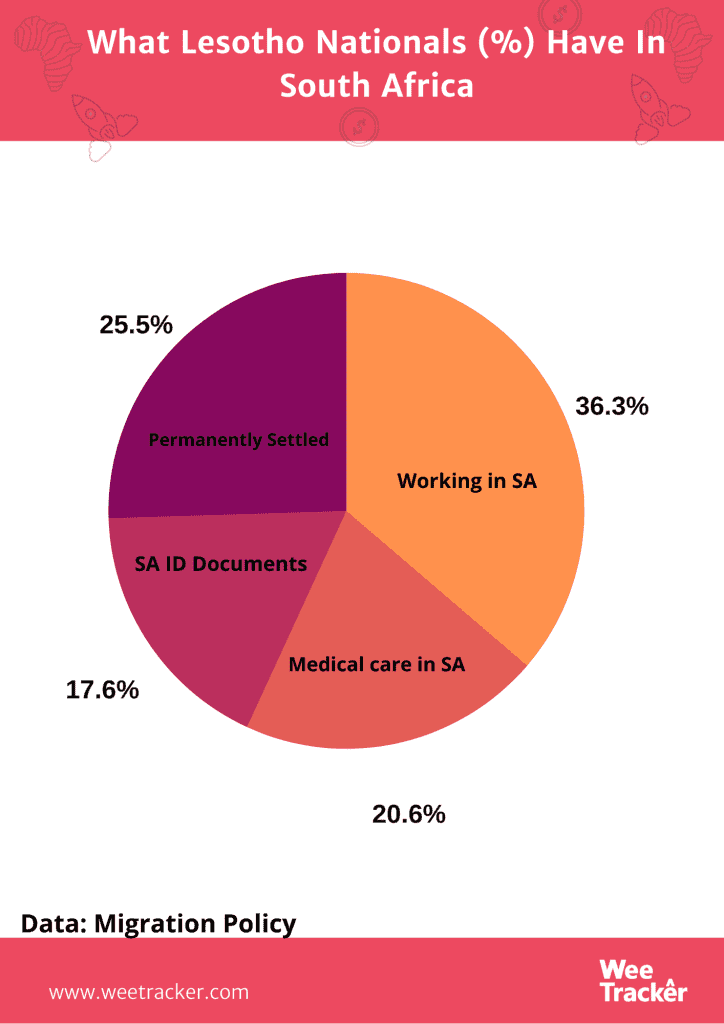The Migration Scare That Could More Than Change Lesotho’s Status As A Covid-19-Free Country

About a week ago, Lesotho enjoyed the status as the only country in Africa that did not have a single case of the novel coronavirus infection. But in the later part of this week, the Basotho nation recorded its index case, a Lesotho national studying in Saudi Arabia.
A Gradual Unfold
Being that Lesotho lacks the testing capacity needed to keep the virus in check, it has been relying on its immediate, surrounding neighbor, South Africa. The nation sends samples to National Institute of Communicable Diseases (NICD) in South Africa.
But due to the new Covid-19 case, there are fears in Lesotho that more cases could arise from the continued illegal crossback into the small kingdom from South Africa, which has 13,524 cases—the highest in the continent.
South Africa’s lockdown restrictions has to be the most talked about in the region, as its ailing economy, struggling lower class and virus spread has put the country in a difficult situation. Lesotho, on the other hand, had a national lockdown from April 30th to May 5th, despite having no case of Covid-19 at the time.
A case coming about 2 weeks after it lifted its lockdown is a major concern, especially as the land-locked country’s health system—like most in Africa— is vastly unequipped to combat the pandemic.
In fact, Lesotho’s lockdown was lifted against the advice against the advice of the country’s inter-ministerial committee whose major concern was the lack of preparedness to deal with an outbreak since quarantine facilities have just 148 beds.
The Greater Risk
Asides from a weak health system, the greater problem that could more than change Lesotho’s status as a Covid-19-free country is the illegal migration of people across the borders of Lesotho and South Africa.
Lesotho is bound on all sides by South Africa, making it a country within another. At first, it was surprising that the kingdom had no case despite the crisis unfolding in its surrounding neighbor, South Africa. But now that it has recorded its index case, there is a greater risk of imported cases.
The ethnic connection between Basotho and South Africans is one of the most important reasons Lesotho nationals can easily visit and stay in South Africa for prolonged periods.
Due to social interactions between the two, Lesotho contributes more than 40 percent of the movement across South African borders from all neighboring countries. The Maseru and Ficksburg bridges handle more travellers than any other posts with any country.
The way the border between Lesotho and the Free State and Eastern Cape is, it does not necessarily form a physical barrier between the two countries, making it a relative ease for people to cross over via any of the 14 border posts or through the illegal routes.
Some children cross borders to attend schools. Adults invite one another to attend social gatherings. These, among others, have made is quite difficult for an outsider to differentiate between Lesotho and South African people. Many Basotho also travel to South Africa frequently for various reasons, using public transport operated by various taxi associations.
Strained Relations
On Monday May 11th, 211 people reportedly crossed into Lesotho from different parts of South Africa, and some 70 people came in during the night. These crossings pose a risk in the wake of the coronavirus pandemic.
In the recent years, cross-border crimes like theft, drug smuggling, human trafficking and money laundering have strained diplomatic relations between Lesotho and South Africa. The countries have moved to tighten their borders to reduce this and protect people.
But most of the propositions have proven hard to execute. The geographic location of Lesotho, being enclaved by South Africa, makes it quite hard to separate the fortunes of one from the other.

Lesotho nationals have not just been part of its community, but also South Africa’s economy. They form part of its wage labor, traders, produce exporters and retail consumers.
Now, perhaps, in a bid to get into a safer environment, Lesotho has become the epicenter of migration in Southern Africa, as hundreds of people have crossed its borders since the virus outbreak.
In many parts of the region, members of the same lineage live on the opposites sides of the borders between South African and Lesotho. Such movements occuring pose a huge risk, especially as other nations are shutting down their borders to limit the spread of coronavirus.
“More than 1,000 Basotho arrived from South Africa over the past few days: 664 came through porous borders from 3rd to 7th May, 2020, 500 came from South African prisons and 97 were held back by the lockdown in that country,” said Ranyali-Otubanjo, a health ministry official in Lesotho.
Conclusively
Once a Lesotho national is in South Africa, he or she can seek employment or self-employment in the large informal sector with relatively little fear of detection. Also, there is not much risk of deportation if detected. And even if deported, it is just as easy to return as though nothing initially happened.
A 2011 research report by the University of the Orange Free State estimated that border crossings between Lesotho and the Free State (a South African province) have increased tenfold over the past 20 years.
The great worry that stems from all of this, again, is that Lesotho is at a huge coronavirus infection risk. It was once the African capital for Covid-19 freedom, but there are signs to show that scaled up testing could reveals some disturbing results the country isn’t prepared for.
Nevertheless, if containment measures are ramped up on both sides alongside proper border restrictions, this could be avoided.
Featured Image: Simon Allen via Unsplash.